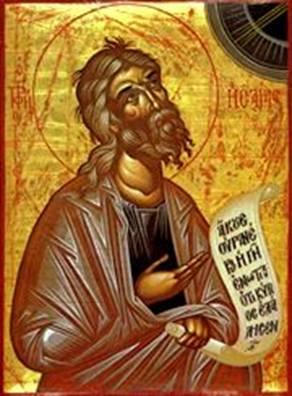Isaiah
ISAIAH
Possible Lesson Plan:
- Open with prayer.
- Scripture Reference: Isaiah 1, 40-41. Have the students silently scan the reading. Then divide into 3 teams. Assign one chapter to each team. Instruct each team to write 5 questions for the other teams about its chapter. Write the answers on the board in three columns entitled “1”, “40”, and “41”. Play Jeopardy with 2 volunteer students if there’s time, or just write the questions.
What brought God’s judgment on His people? Why wouldn’t the people listen to Isaiah’s warnings? Why did God bother to reach out to His people?
- History: While Elijah and Elisha were prophets of Israel, the northern kingdom, Isaiah prophesied to Judah, the southern kingdom. He lived during the reigns of Ahaz and Hezekiah. He warned the people of Judah about the consequences of their actions. Judah didn’t listen, and Isaiah’s predictions came true. But, in the later chapters, God offers through Isaiah encouragement for Judah after the nation suffered the consequences of their actions and went into exile.
- Service References: The coal of Isaiah makes its way into many services. At Theophany: “The living coal that Isaiah foresaw is kindled in the waters of the Jordan, and He will burn up the whole substance of sin and grant restoration to the broken.” The vision itself from Isaiah 6 is read at the vespers of the Meeting of the Lord. The Theotokos becomes a pair of tongs: “Mary, thou art the mystic Tongs, who hast conceived in thy womb Christ the live Coal.” And “Christ the coal of fire, whom holy Isaiah foresaw, now rests in the arms of the Theotokos as in a pair of tongs, and He is given to the Elder.” Simeon answered, “Isaiah was cleansed by receiving the coal from the seraphim…Thou dost fill me with light as thou dost entrust to me, with thy hands as with tongs, Him whom thou holdest…” What is a tongs? How is Jesus a coal and Mary a Tongs?
Isaiah’s prophecies of Jesus are myriad. He prophesies the Virgin birth, the crucifixion, the resurrection, and the ascension. Chapter 52 is read on Holy Friday. The Paschal Canon recognizes the phenomenal nature of Isaiah’s prophecies in “Isaiah, as he watched by night, beheld the light that knows no evening, the light of Thy Theophany, O Christ that came to pass from tender love for us; and he cried aloud: ‘The dead shall arise and they that dwell in the tomb shall be raised up, and all those born on the earth shall rejoice exceedingly.’” And Isaiah 62-63 is read at Ascension: “Wherefore are his clothes red? Because he cometh from…the flesh.” Can you think of some other prophecies of Isaiah?
- Discussion: Ahead of class, make a group of traffic signs out of construction paper – Stop sign, Yield sign, One Way, No Parking, Speed Limit, etc. Hold these up and ask the teens what they mean and what could be the consequences of disobeying them. Do people always consider the consequences of their actions? Why not?
Now list on the board some tough situations involving obedience to God or parents that might face a teen (or have the class brainstorm these). You might include things like “I start using drugs”, “I cheat on a test”, “I have sex with my girl/boyfriend”, “I break the speed limit”, “I stop going to Church”, “I sneak out of the house to go to a bar”, “I start smoking”, “I talk behind someone’s back”, “I don’t study for a test”, etc. Make another column and list the likely consequences of these acts of disobedience.
What are the consequences of going against God’s will? Is it fair for every bad deed to have a bad consequence? What if we are sorry and never do it again? Does God sometimes let people “get by” without suffering the consequences? Is that fair? Can you think of a time when someone didn’t get what he or she deserved? What about yourself? How come some people don’t get “caught”? What about others who do wonderful deeds all their lives and never get any recognition? Is God fair? Or do people only seem to avoid the consequences of their actions?
- Close with prayer: Have each student consider one wrong action for which God has allowed them to go without facing the consequences. Repent of these actions and ask God to help us know His direction and make wise choices.

J